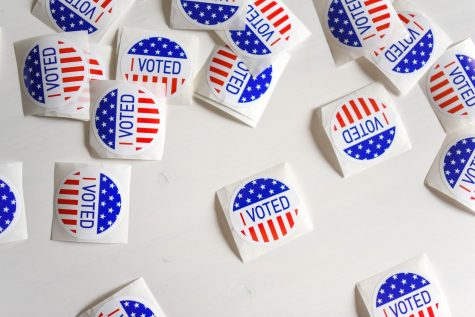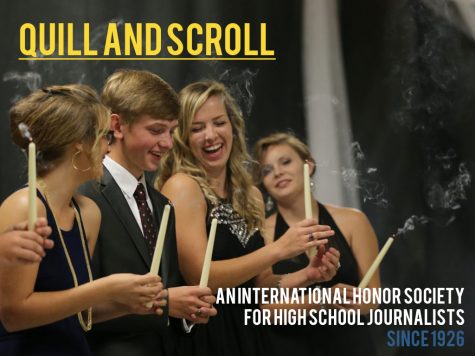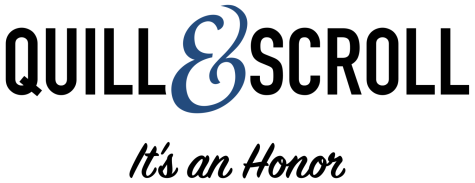THE WEEKLY SCROLL
November 4, 2020
News, tips and advice from Quill and Scroll
The Lede
Voting by the numbers
We still don’t know, and that’s OK
It’s Thursday morning, nearly 36 hours after all polls closed Tuesday night, and the United States is still picking its president for 2021-2025.
And that’s just fine.
Because of the pandemic, and because the U.S. Postal Service lost track of — not lost, just not tracked — about 300,000 ballots, we may not know until the end of the week or even next week whom we expect to lead the U.S. for the next four years, President Donald Trump or former Vice President Joseph Biden. Trump’s attorneys have filed lawsuits in various states to either stop counting votes where he’s ahead or continue to count votes where he’s behind.
However this turns out, the world is watching. And it’s alternately horrified and fearful of how U.S. citizens will react when a final result is clear.
America’s voting history in the past twenty years
With the rise of absentee and early voting in 2020, you may be wondering what the United States’ voter trends have been in recent history. Here’s a comparison of numbers in recent years, according to the United States Election Project:
2020 Election:
Early voters: 100,978,567
Voting eligible population: 239,247,182

Photo by Element5 Digital on Unsplash
2016 Election:
Total voters: 138,846,571
Percentage of voting population: 60.1%
2012 Election:
Total voters: 130,292,355
Percentage of voting population: 58.6%
2008 Election:
Total voters: 132,609,063
Percentage of voting population: 62.2%
2004 Election:
Total voters: 123,535,883
Percentage of voting population: 60.7%
2000 Election:
Total voters: 107,390,107
Percentage of voting population: 55.3%
There are a few things we can gather from this data. First, the number of early voters in 2020 makes up over 42% of the voting population in America. Comparing this to recent years, this puts early votes around 16-20% away from past total voting percentages. That is a lot of people!
In 2020, there’s been a strong endorsement of voting by average citizens, celebrities and elected officials. When we compare the voting numbers as they stand today, it appears that more people are voting (or at least, voting early) than in recent years.
The highest election turnout in history was the 1876 election between Rutherford B. Hayes and Samuel J. Tilden, with an eligible voter turnout rate of 82.6% (however, it is important to note this vote excludes pretty much anyone who was not a white male). The highest voter rate in the last 100 years was the 1960 election between John F. Kennedy and Richard Nixon, with a 63.8% voter turnout.
The moral of the story is, voting is important. Exercising our civil rights are important. Even though we are just now getting through an election cycle, look forward to the next four years when you, too, will be able to exercise your right to vote.
Representational firsts in 2020 U.S. election
House and Senate elect LGBTQ+ representatives
As election results pour in Tuesday and Wednesday, America is paying close attention to two specific candidates that will be representing their states in the House and Senate until the next electoral term. Mauree Turner, new House representative from Oklahoma, will be the first Muslim lawmaker in Oklahoma history and first non-binary state legislator in American history.
The 27-year-old ran her campaign oriented toward the issues of her representative district, including incarceration rates and minimum wage concerns.
In response to her win, Turner said, “We are no longer fighting for a seat at the table. We’re creating a whole new table where everybody eats.”
Delaware elected Sarah McBride, the first openly transgender state senator in United States history. The election makes her the highest ranking transgender official in the country. She also serves as the spokesperson for the Human Rights Campaign.
McBride remains the only transgender official elected to the Senate, but there are five openly transgender persons serving in Congress.
Ritchie Torres won the seat to represent the South Bronx in New York City. He will be the first black and gay Congressman in the U.S.
Q&S charter school breaks national news
Dupont Manual’s coverage of Kentucky State Police training scoops national news organizations
The Quill and Scroll chapter at Dupont Manual High School in Louisville, Kentucky published a major story late last month titled, “KSP training slideshow quotes Hitler, advocates ‘ruthless’ violence,” about the use of quotes from Nazi leader Adolf Hitler in a Kentucky State Police training presentation until 2013.
The information in question was obtained by an attorney during the discovery phase of a lawsuit and then shared the information with journalists representing Dupont Manual’s “Manual Redeye.”
The presentation includes quotes from Adolf Hitler’s fascist manifesto, “Mein Kampf,” and links to a Goodreads article on Adolf Hitler that provides further reading and quotes by Hitler. Hitler was quoted on three other slides, making him the most quoted man in the presentation, according to guest “Manual Redeye” writers Satchel Walton and Cooper Walton.
Confederate General Robert E. Lee is also quoted in the presentation.
Quite simply, the U.S. fought and won two bloody wars to end the fascist, white supremacist Nazi threat in Europe and to quell the traitorous secession by slave states in the South who feared they’d lose their ability to maintain legal slavery. Using Hitler and Lee in a training for state employees is highly dubious, at best, and flagrantly racist at worst.
The contents of the presentation comes to light in a time of heavy discussions of systemic racism as well as uproar of the shooting of Breonna Taylor by the Louisville Metro Police Department in March.
“Manual Redeye’s” article received statewide attention and response from the Kentucky state governor, the Kentucky Justice and Public Safety Cabinet, Kentucky’s 3rd Congressional District and the Kentucky State Police Department. The article is a fantastic representation of scholastic investigative journalism, especially when contemplating the timeliness of the article.
Not only was the article widely circulated in Kentucky, “The New York Times” also picked up the story and distributed the information to a wide audience.
Here at Quill and Scroll, we advocate for spaces where high school journalists can push their achievements past the assumed level of high school journalistic work. The “Manual Redeye” demonstrated their commitment to truth, leadership, integrity and initiative, four of our founding principles, in pursuing this story and informing the general public of problems that were present within the Kentucky safety system that were previously unknown. What a fantastic representation of the impact high school journalism can have on the lives of those surrounding an issue.
While you may not feel like you have a groundbreaking story, you do have important things to say. Reach for those stories that are outside of your comfort zone: journalism is about serving the public.
It is scary to push the envelope. But the reward can be found in the lines of the story.
It’s An Honor
 Q&S Updates
Q&S Updates
Q&S Board allows non-school chapters to form
The Quill and Scroll Board of Trustees amended its constitution this month to allow non-school organizations to apply for charters and, if granted, to form chapters with the students inducted into the organization. This week, Eye on Ivy, an educational consulting firm based in Pakistan, became the first non-school organization to apply for and be granted a charter. Eye on Ivy works with students who produce content for national, regional and school publications, both in print and online.
We anticipate welcoming other new chapters in places around the world and in the U.S., including local news outlets that publish stories written and/or produced by high school students.
The amended constitution does not change the basic qualifications for induction into the society. Though some schools have more stringent requirements, students need to:
- Excel in the academic arena by earning a 3.0 GPA or by being in the top-third of a student’s class.
- Excel in journalism by doing significant work in a publication, broadcast entity or an online news source.
It’s never too late (or early!) to honor seniors and induct members
If you put off your spring celebrations, you can still induct new Quill and Scroll members and honor seniors this fall. We’re able to take and fulfill orders, even as Quill and Scroll staff work from both our home offices and our offices at the Adler Journalism Building on the University of Iowa campus.
We published this update earlier in August. It includes a simplified order form for schools and advisers willing to pay via credit card, and an offer to host an online induction ceremony for your students. The sooner you induct new members, the sooner they’ll be able start planning chapter activities in the spirit of Quill and Scroll. Here’s a link to a PDF file of the Q&S Chapter Handbook if you don’t already have it.
A reminder about cords:
Students MUST HAVE BEEN OR WILL BE INDUCTED into the Society to earn the honor to wear an Honor Cord (GHC) or Honor Cord with Insignia (GCI). If you order cords for non-members, please choose the Non-Member Cord Option (NCD). Quill and Scroll exists because of the special unifying bond brought about by membership and the lasting legacy of the induction ceremony.
And, as always, feel free to email [email protected] if you have any questions.
Yearbook Excellence Contest closed for entries
Quill and Scroll’s 2020 Yearbook Excellence Contest closed for entries on Oct. 17. We are in the process of distributing over 1,000 entries to our judges.
Winners will be announced in early December. Until then, keep producing great journalism!
Writing, Photo and Multimedia Contest is next!
Get ready to start submitting entries for the Writing, Photo and Multimedia Contest starting in December. The final entry deadline will be Feb. 10, but it’s never too early to start looking at your best work and deciding which and how many to enter.
For the first time, the WPM Contest will be split into Class A (large schools) and Class B (not-as-large schools) based on enrollment. That means more chances to earn a first, second or third place. As always, at least 10 percent of all entries will be recognized as winners.
We’ve added three new categories:
- Sports Game Coverage
- Pandemic Coverage (Single Story)
- Pandemic Coverage (Series of Stories)
Here’s where you can find all the categories, as well as last year’s winners.
Director summarizes 2019-2020
If you’re interested in reviewing the 2019-2020 fiscal year, read Jeff Browne’s full annual report, click here.
What’s Viral?
Yeezy makes a political statement
Kanye West posts video of ballot insertion, reveals who he is voting for
Do you remember when it was July and the 2020 election seemed like a distant race and Kanye West was announcing his candidacy for President of the United States? Well, the 2020 election is here, and the rapper WAS present on the ballot (at least in some states).
West posted a video Tuesday to Twitter exercising his civil right to vote. Viewers immediately investigated the video to see who West voted for; upon a closer look, viewers can see that West voted only for president – and left all other positions blank.
https://twitter.com/kanyewest/status/1323727338387902465
West demonstrated his right to vote for a write-in candidate; in this case, West voted for himself and running mate Michelle Tidball. He included in his tweet that this was the first time he participated in an election as a voter.
West did eventually concede the 2020 election, but did tweet Tuesday night “KANYE 2024.”
However, West’s post brings up a question of legality in posting a video of his ballot, especially at a polling station. Many of West’s followers noted they believed posting a picture of a completed ballot was illegal. So, what’s the law?
First, you want to make sure you check your individual state’s laws on posting photos or videos of completed ballots. In recent years, states have changed their stance on social media posts involving electoral ballots (because of the growth of social media). Before you post with your ballot, or even if you have already posted with your ballot, make sure you know the rules in your specific state. Check out this interactive map to see your state’s law and those of your favorite celebrities.
Keeping up with… well, the Jenners
Kendall Jenner hosts Halloween birthday party amid COVID-19 concerns
Kendall Jenner hosted a birthday party Saturday to celebrate turning 25 Tuesday. The problem? There were over 100 people in attendance during a time when COVID-19 cases hit an all time high this past month. According to the California Department of Public Health, gatherings that include more than three households are prohibited in the state currently.
According to “People Magazine,” attendees were asked not to post about the party on social media to avoid public backlash. Photos did surface and most guests are pictured without masks. However, “Entertainment Tonight” confirmed that everyone in attendance was required to take a rapid COVID-19 test and receive a negative result before entering the party.
This calls into question how the star gained access to an abundance of rapid test materials.
Earlier this month, Jenner’s older sister, Kim Kardasian, came under fire for hosting a similar birthday bash on a private island.
‘Positions’ tops charts, breaks records
Ariana Grande’s sixth studio album tops new music polls
Pop singer Ariana Grande launched “Positions,” her sixth studio album, on October 30. The album includes 14 songs and was introduced with the release of the single with the same name.
The album was voted as the top new music release for the second week in a row, followed by Sam Smith, Harry Styles and Dua Lipa.
Her single “Positions” debuted at the top of the Billboard Hot 100 charts, making the song Grande’s fifth single to debut at number one. She is now the only artist in history to have five songs debut at number one on the Hot 100 charts. It is also Grande’s third number one of the year – her collaborations with Lady Gaga and Justin Bieber reached the top this summer.
The debate now remains: which song from Grande’s newest album do you want to see as her next single?
Just A Thought

Photo by Taras Chernus on Unsplash
Twin pandemics
We know about COVID. Can we talk about the lying?
We get it. Politicians lie. Always have, always will, right? We know about the 22,000-plus “false and misleading claims” President Trump has made since taking office. And that’s only through Aug. 27, 2020. He falsely — or possibly only prematurely — claimed victory early Wednesday morning.
And while The Washington Post needs to continue to keep track of those lies — and to keep track of all false and misleading statements Joe Biden will make if he becomes the next president — the focus on politicians only takes the spotlight off our own failures as truth-tellers.
The U.S. woke up on Wednesday morning hoping that we might have more insight than we had Tuesday evening regarding the presidential election and other down-ballot races in states around the country.
What we learned is that the pollsters supposedly “got it wrong” for the second time in the last two presidential elections. They predicted a Democratic rout and as of this morning, nothing has been decided at the national level, though a Democratic majority in the House is probable and a Republican majority in the Senate is probable, though it may not be decided until January when Georgia holds at least one run-off election for the Senate.
But did the polling companies really get it wrong? After all, data science and scientific polling have been used for at least a century to get a handle on how humans think and act. Marketing uses demographic and psychographic studies to learn how to sell stuff to us. The science is always being refined, but it’s almost always reliable.
Of course, it’s only as reliable as the data that it collects. And if Americans deliberately lie to hide their true thoughts and actions, then the resulting polls using that flawed data are useless.
This Florida television news show interviewed people who said that Trump supporters lie about their support of the president. This Politico article suggested before the election that they lie about their support because they don’t want to be ridiculed.
Is this our lives now? Is lying not an amoral act, but simply a strategy to “throw off the eggheads” or to avert real or perceived bullying by political opponents. Are we all now Corey Lewandowski?
You remember him, right? He was the former 2016 Trump campaign manager who told the truth to Congress about lying to journalists about his role in covering up the president’s potential obstruction of justice. Lewandowski’s answer to Congress about telling direct lies on television?
“I have no obligation to have a candid conversation with the media whatsoever, just like they have no obligation to cover me honestly, and they do it inaccurately all the time,” Lewandowski said.
In other words, if you think journalists are lying about you, it’s perfectly fine to lie directly to them and to the people to whom they report news.
In any civil society, in any democratic system of government, we rely on several institutions to keep us grounded in reality — science, academia, journalism and the court system among them. If we undermine any of those, we lose our tether to a shared vision of our current state, and without that, chaos enters to take those institutions’ spots.
And that’s where we are today, a long way from that April day in 1926 when 19 high school journalism advisers gathered in Iowa City to form the Quill and Scroll Society and state as its foundational principle an allegiance to truth.
Those of you who are members of the Society most likely remember promising during the induction ceremony to remain true to that ideal. Now is the time to re-dedicate yourself to that pledge, formally or informally.
In the words of John Lennon:
I’m sick and tired of hearing things
From uptight, short-sighted, narrow-minded hypocrites
All I want is the truth
Just gimme some truth
I’ve had enough of reading things
By neurotic, psychotic, pig-headed politicians
All I want is the truth
Just gimme some truth
— Jeff Browne, Quill and Scroll Executive Director
